Contents
Introduction to Self Awareness
Self-awareness is the ability to introspect and recognize one’s thoughts, emotions, behaviors and the underlying motivations that drive them. Rooted in the very essence of our existence, self-awareness is a cornerstone of personal growth, emotional intelligence, and enriched relationships.
In this article we will explore the exploration of the theoretical foundations of self-awareness and describe psychological models and philosophical perspectives, elucidating their role in shaping identity and fostering a profound connection with oneself.
Examining the benefits of self-awareness reveals enhanced emotional intelligence, improved decision-making, and increased resilience. Individuals with heightened self-awareness often cultivate more fulfilling relationships and navigate life’s complexities with greater efficacy. This underscores the significance of fostering self-awareness for comprehensive well-being.

Factors influencing self-awareness, whether internal or external, present challenges and barriers that may impede its development. Identifying techniques for enhancing self-awareness, such as mindfulness practices and reflective journaling, becomes imperative in overcoming these obstacles.
Real-life case studies exemplify the tangible impact of self-awareness, offering concrete illustrations of its transformative potential in diverse contexts, be it leadership, mental health, or interpersonal dynamics.
The significance of self-awareness extends far beyond mere introspection. It is a powerful tool that empowers us to navigate the complexities of life with clarity and purpose. As we search into the layers of our psyche, we reveal the underlying forces steering our actions and choices. This heightened awareness empowers us to make intentional decisions in harmony with our true selves, cultivating a sense of congruence and authenticity.
Importance of Developing Self Awareness
- Self-awareness is compared to tending a garden within us, requiring deliberate effort and attention like a gardener tending to unique plant needs.
- It leads to self-discovery by uncovering unconscious behavior patterns allowing personal growth and shedding limiting beliefs.
- Self-awareness is the cornerstone of emotional intelligence, enabling us to manage our emotions and empathize with others, enhancing communication and relationships.
- In a busy world filled with distractions, self-awareness acts as an anchor, promoting mindful responses over impulsive reactions and building inner resilience.[1]
Theoretical Foundations of Self-Awareness
To explore the intricacies of self-awareness, it is essential to establish a solid grasp of the theoretical frameworks that form the foundation of this complex psychological concept.
Over time, the insights of psychologists and scholars have played a crucial role in molding our understanding of self-awareness, revealing its multifaceted nature and shedding light on the various paths toward its development.
Through this section, we will discuss these factors:
- Self-Awareness Theory
- Symbolic Interactionism
- Theory of Mind
- Humanistic Perspective
- Cognitive Dissonance Theory
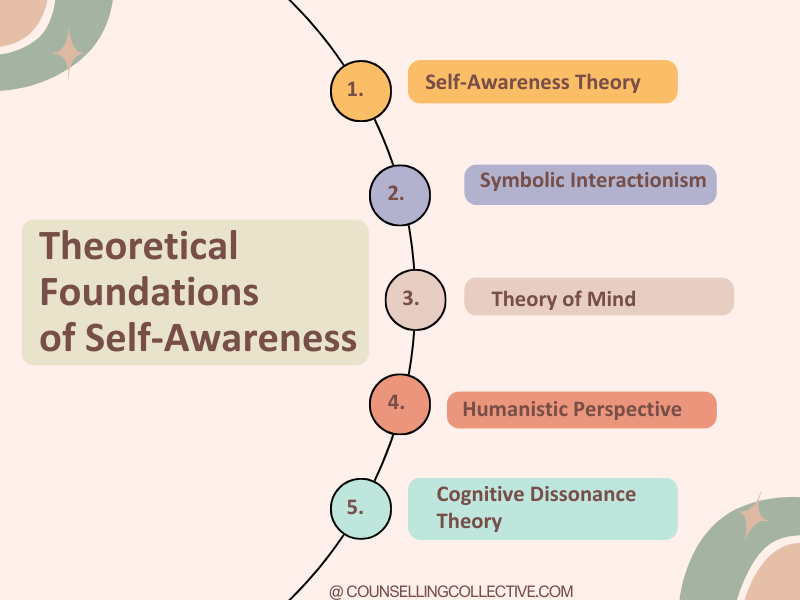
Self-Awareness Theory
Central to the exploration of self-awareness is the eponymous Self-Awareness Theory proposed by Duval and Wicklund in 1972.
This theory posits that self-awareness emerges when an individual directs their attention inward, focusing on their thoughts, feelings, and behaviors. This heightened self-focus leads to a state of self-evaluation, wherein individuals compare their current state to internal standards and societal norms.
This introspective process can trigger a discrepancy between the perceived self and the ideal self, catalyzing a desire for self-improvement or alignment.
Symbolic Interactionism
The tenets of Symbolic Interactionism contribute profoundly to our understanding of self-awareness as a socially constructed phenomenon. Originating from the work of George Herbert Mead, this theory emphasizes the role of interaction and communication in shaping one’s self-concept.
According to Symbolic Interactionism, individuals develop a sense of self through their interactions with others, internalizing societal symbols and meanings. This process of socialization fosters self-awareness as individuals gauge their behavior and identity in response to societal cues and expectations.
Theory of Mind
The Theory of Mind, a cornerstone in developmental psychology, sheds light on the emergence of self-awareness in childhood. Proposed by Premack and Woodruff in 1978, this theory highlights an individual’s capacity to attribute mental states, such as beliefs and intentions, to oneself and others. As children acquire the ability to comprehend the perspectives of others, they concurrently develop self-reflective awareness.
This cognitive milestone forms the bedrock of self-awareness, enabling individuals to grasp their own internal mental states and differentiate them from external realities.
Humanistic Perspective
The Humanistic Perspective, championed by prominent figures like Carl Rogers and Abraham Maslow, underscores self-awareness as a fundamental aspect of personal growth and self-actualization. This theory has these main points:
Innate Drive for Fulfillment:
- This perspective suggests that individuals inherently desire to reach their maximum potential and harmonize with their authentic selves.
- It emphasizes an inherent motivation to grow and become the best version of oneself.
Self-Awareness as a Catalyst:
- Self-awareness is presented as a catalyst in this viewpoint.
- It propels individuals to engage in introspection and self-exploration.
Fulfilling Unique Aspirations:
- Individuals utilize self-awareness to fulfill their distinct aspirations.
- It’s a means for aligning with their genuine desires and ambitions.
Attainment of Self-Fulfillment:
- The ultimate goal is to achieve a state of self-fulfillment.
- Self-awareness is seen as a tool for realizing one’s potential and living authentically.
Cognitive Dissonance Theory
Further enriching our understanding of self-awareness is the Cognitive Dissonance Theory, introduced by Festinger in 1957. This theory postulates that individuals experience discomfort when their beliefs, attitudes, and behaviors are incongruent. The pursuit of harmony drives individuals to alleviate this dissonance through introspection and the adjustment of their attitudes and behaviors.
cognitive dissonance theory underscores how self-awareness motivates individuals to attain cognitive consistency within their psyche.
These theoretical frameworks weave a rich tapestry, helping us unravel the intricate facets of self-awareness. They shed light on the dynamic interplay among self-perception, social context, cognition, and personal growth, revealing the intricate mechanisms contributing to the development of this fundamental psychological trait.[2]
Benefits of Self-Awareness
The journey into self-awareness brings transformative benefits to various aspects of human experience.
In this section, we will explore these topics:
- Enhanced Emotional Intelligence
- Improved Self-Regulation
- Heightened Decision-Making Clarity
- Strengthened Interpersonal Relationships
- Resilience and Stress Management
- Personal Growth and Fulfillment [3]
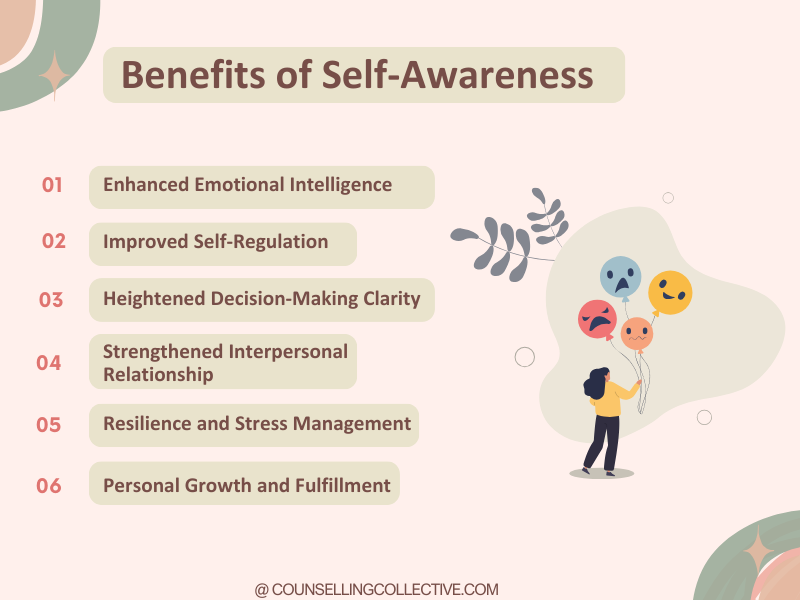
| Aspect | Description |
| Enhanced Emotional Intelligence | Development of enhanced emotional intelligence through self-awareness.Recognition and understanding of both personal and others’ emotions. Navigating social interactions with empathy, attunement, and compassion, forging deeper connections and meaningful bonds. |
| Improved Self-Regulation | Self-awareness as a compass for guiding individuals in self-regulation.Identification of triggers for impulsive or detrimental behaviors. Implementation of effective coping strategies. Conscious control over actions and reactions.Bolstered ability to manage stress and make decisions aligned with personal values. |
| Heightened Decision-Making Clarity | Empowerment through self-reflection for heightened clarity in decision-making. Awareness of core values, strengths, and aspirations. Making choices authentic to true selves.Mitigation of external pressures, allowing alignment with genuine aspirations. |
| Strengthened Interpersonal Relationships | Cultivation of self-awareness fostering healthy interpersonal relationships. Attunement to personal needs, desires, and communication styles. Contribution to more effective and harmonious interactions with others. Articulation of thoughts and feelings with authenticity, nurturing bonds based on mutual understanding and respect. |
| Resilience and Stress Management | Equipping individuals with a powerful toolset for navigating life’s challenges. Introspection to pinpoint sources of stress and recognize negative thought patterns. Identification of maladaptive coping mechanisms. Proactive implementation of stress-reduction strategies and fostering a resilient mindset. |
| Personal Growth and Fulfillment | The culmination of the journey of self-awareness in profound personal growth and fulfillment. Peeling back layers of self-perception to unlock innate potential. Embarking on a transformative odyssey of self-discovery. Alignment with authentic selves, embracing unique qualities, and pursuing growth resonating with passions and aspirations. Lifelong expedition toward self-fulfillment and realization of highest potential. |
As we explore the profound advantages that self-awareness bestows upon us, we bear witness to its transformative power in shaping the contours of our lives and nurturing a flourishing existence.
Factors Influencing Self-Awareness
Understanding these influences provides valuable insights into the nuances of self-discovery and offers a roadmap for fostering a deeper connection with one’s inner self. These factors are:
- Self-Reflection Practices
- Feedback from Others
- Life Experiences and Challenges
- Cultural and Societal Context
- Emotional Intelligence
- Cognitive Processes
- Environmental Factors
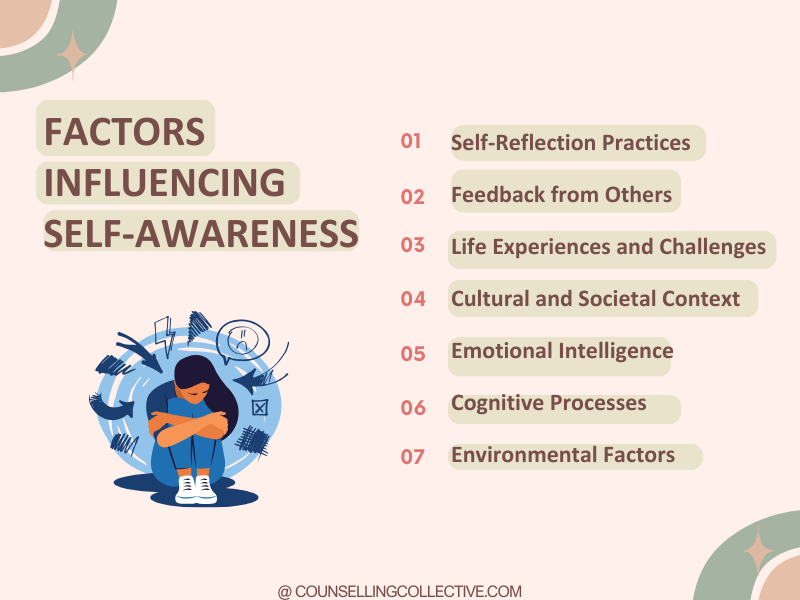
Self-Reflection Practices:
- Deliberate self-reflection is a cornerstone for enhancing self-awareness.
- Regular practices include introspection, journaling, and mindfulness exercises.
- These create sacred spaces for self-exploration, heightening awareness of inner narratives, desires, and behavior patterns.
Feedback from Others:
- External perspectives, especially constructive feedback from trusted individuals, contribute to self-awareness.
- Insights from friends, family, mentors, and colleagues illuminate blind spots and areas for growth.
- Honest reflections from others provide fresh vantage points on personality and behavior.
Life Experiences and Challenges:
- Life experiences, both triumphs and challenges, significantly contribute to self-awareness.
- Confronting challenges and celebrating accomplishments offer opportunities for introspection.
- Lived experiences provide a clearer understanding of strengths, weaknesses, and coping mechanisms.
Cultural and Societal Context:
- Cultural and societal influences profoundly shape self-awareness.
- Norms, values, and expectations influence self-concept, identity, and self-expression.
- Awareness of cultural influences prompts critical examination of beliefs and assumptions.
Emotional Intelligence:
- Emotional intelligence synergistically interacts with self-awareness.
- Proficiency in emotional intelligence enhances awareness of emotional states.
- Enables deciphering of emotional responses and triggers, contributing to healthier emotional regulation and authentic interactions.
Cognitive Processes:
- Metacognition, introspection, and self-perception contribute to self-awareness.
- Metacognition, thinking about one’s thinking, facilitates the examination of mental processes and beliefs.
- Introspection involves a deep dive into thoughts and feelings and identifying cognitive patterns and biases.
Environmental Factors:
- The environment shapes self-awareness, including physical spaces and social contexts.
- Surroundings can either facilitate or hinder introspection.
- Conducive environments that encourage self-exploration, mindfulness, and self-expression nurture the growth of self-awareness.[4]
Techniques for Enhancing Self Awareness
Embarking on a journey of self-discovery and heightened self-awareness requires a repertoire of effective techniques. These empowering strategies provide the compass for navigating the terrain of one’s inner world and fostering a profound connection with oneself. By embracing these techniques, individuals can unlock the doors to self-awareness and embark on a transformative path of personal growth.[5]
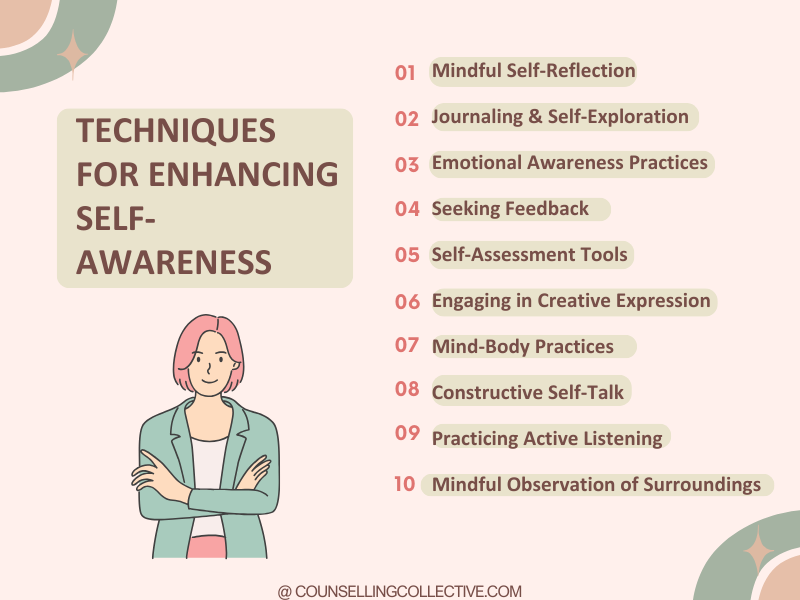
| Category | Description |
| Mindful Self-Reflection | Mindfulness is a powerful tool for cultivating self-awareness. Engage in mindful self-reflection by consciously directing attention to thoughts, emotions, and sensations without judgment. Use meditation, journaling, or simply being present at the moment to observe the inner landscape, unveiling hidden patterns, triggers, and desires. |
| Journaling and Self-Exploration | Journaling offers a haven for self-expression and exploration. Externalize thoughts and feelings by putting pen to paper, allowing for a deeper understanding of the inner world. Prompts such as “What am I grateful for?” or “What triggered my emotions today?” encourage introspection and pave the way for self-awareness. |
| Emotional Awareness Practices | Developing emotional awareness is pivotal for enhancing self-awareness. Techniques like the “Emotional Wheel” involve identifying and labeling emotions, enabling recognition and differentiation of nuanced feelings. Emotion-focused exercises promote a keen awareness of emotional states, facilitating healthier responses to stressors and challenges. |
| Seeking Feedback and Perspective | Actively seek feedback from trusted individuals for valuable insights into hidden aspects of oneself. Constructive criticism and honest observations offer fresh perspectives, highlighting strengths and areas for growth. Engage in open and respectful conversations with peers, mentors, or therapists to illuminate blind spots and deepen self-awareness. |
| Self-Assessment Tools | Numerous self-assessment tools and inventories facilitate self-awareness. Personality assessments like the Myers-Briggs Type Indicator (MBTI) or the Big Five Personality Traits offer frameworks for understanding traits and tendencies. Encourage self-reflection and provide a language to articulate personal attributes. |
| Engaging in Creative Expression | Numerous self-assessment tools and inventories facilitate self-awareness. Personality assessments like the Myers-Briggs Type Indicator (MBTI) or the Big Five Personality Traits offer frameworks for understanding traits and tendencies. Encourage self-reflection and provide a language to articulate personal attributes. |
| Mind-Body Practices | Mind-body practices, including yoga, meditation, and breathwork, bridge the physical and mental awareness gap. Encourage individuals to connect with bodily sensations, fostering an intimate understanding of how emotions manifest physically. Promote a holistic approach to self-awareness. |
| Constructive Self-Talk | Conscious self-talk involves monitoring and directing internal dialogues. Challenge negative self-talk and cultivate self-compassion to gain insights into cognitive processes. Encourage self-reflection, enabling the identification of limiting beliefs and self-imposed barriers. |
| Practicing Active Listening | Listening attentively to oneself and others is a cornerstone of self-awareness. Engage in active listening during conversations to encourage mindfulness and empathy one the skill of attentive listening to discern reactions, biases, and emotional responses in various interactions. |
| Mindful Observation of Surroundings | Listening attentively to oneself and others is a cornerstone of self-awareness. Engage in active listening during conversations to encourage mindfulness and empathy one the skill of attentive listening to discern reactions, biases, and emotional responses in various interactions. |
Each technique acts as a distinctive portal, unveiling layers of the self, facilitating personal growth, nurturing self-compassion, and fostering the growth of authenticity.
Challenges and Barriers to Self-Awareness
The pursuit of self-awareness is rewarding but comes with challenges. Acknowledging and navigating these obstacles is essential for an enriched and authentic journey of self-discovery.
In this section, we will learn about:
- Cognitive Biases and Blind Spots
- Fear of Self-Exploration
- Social and Cultural Influences
- Lack of Self-Compassion
- Over-identification with Thoughts and Emotions
- Resistance to Change
- Emotional Avoidance
- Unrealistic Self-Expectations
- Lack of Time and Prioritization
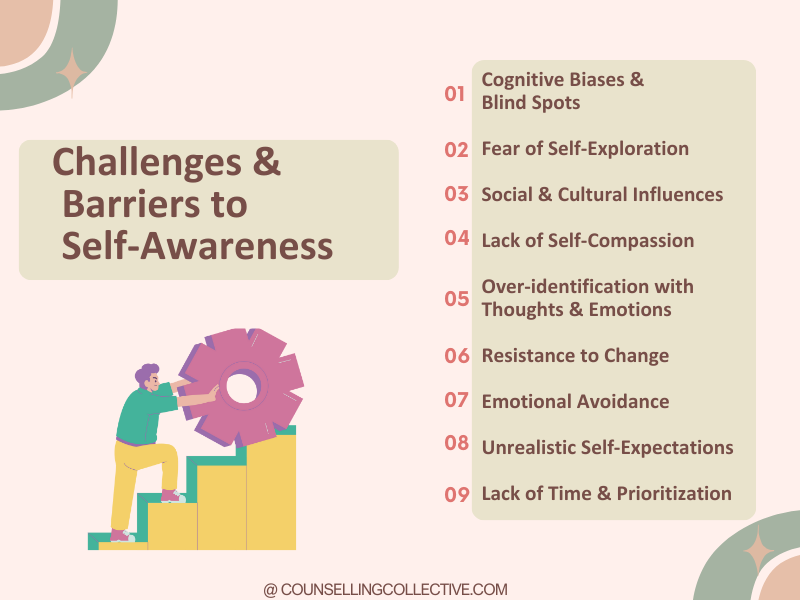
Cognitive Biases and Blind Spots
Cognitive biases, such as confirmation bias or the illusion of superiority, can cloud self-perception. These biases shape how individuals interpret information, often leading to distorted self-views.
Overcoming cognitive biases requires a commitment to critical self-reflection and a willingness to challenge preconceived notions.
Fear of Self-Exploration
Exploring one’s emotions, thoughts, and past experiences can trigger feelings of fear and discomfort. Individuals may resist confronting painful memories or suppressed feelings.
This fear can hinder the process of self-awareness, necessitating courage and resilience to confront and process these emotions.
Social and Cultural Influences
Societal norms, cultural values, and peer pressure can exert powerful influences on self-perception. The desire to conform to social expectations or fit into predetermined roles may overshadow genuine self-discovery. Untangling the web of external influences from authentic self-awareness requires introspection and a commitment to authenticity.
Lack of Self-Compassion
A lack of self-compassion can impede self-awareness by fostering self-criticism and judgment.
Negative self-talk and harsh self-evaluation undermine the process of exploration and self-understanding. Cultivating self-compassion is pivotal in creating a nurturing environment for self-awareness to flourish.
Over-identification with Thoughts and Emotions
Over-identifying thoughts and emotions can obscure a clear understanding of the self. When individuals become entangled in their fleeting mental states, they may lose sight of their deeper essence.
Practicing mindfulness and detachment from thoughts facilitates a more objective perspective on one’s experiences.
Resistance to Change
Self-awareness often leads to revelations that necessitate change and growth. Individuals may resist relinquishing old patterns and habits, even if they no longer serve their well-being.
Embracing change requires an open mindset and a willingness to step outside the comfort zone.
Emotional Avoidance
Avoiding uncomfortable emotions can hinder the path to self-awareness. Suppressing emotions or resorting to distractions prevents individuals from gaining insights into their emotional landscapes.
Confronting and processing emotions is essential for a comprehensive understanding of oneself.
Unrealistic Self-Expectations
Setting unrealistic expectations for self-awareness can lead to frustration and disappointment. The journey of self-discovery is gradual and ongoing, requiring patience and self-acceptance.
Embracing imperfections and setbacks as integral parts of the process fosters a healthier approach to self-awareness.
Lack of Time and Prioritization
Modern life’s demands can leave little time for introspection. A lack of prioritization may result in neglecting self-awareness practices.
Carving out dedicated time for self-reflection and exploration is vital for nurturing self-awareness amidst the hustle and bustle of daily life.[6]
Real-Life Examples
The transformative power of self-awareness becomes evident when we delve into real-life scenarios where individuals have navigated challenges, harnessed their strengths, and reaped the rewards of self-discovery.
These case studies provide insights into the practical application of self-awareness techniques and their impact on personal growth.
- Example 1: Sarah’s Journey to Self-Compassion
- Example 2: Alex’s Path to Emotional Regulation
- Example 3: Maya’s Authentic Leadership
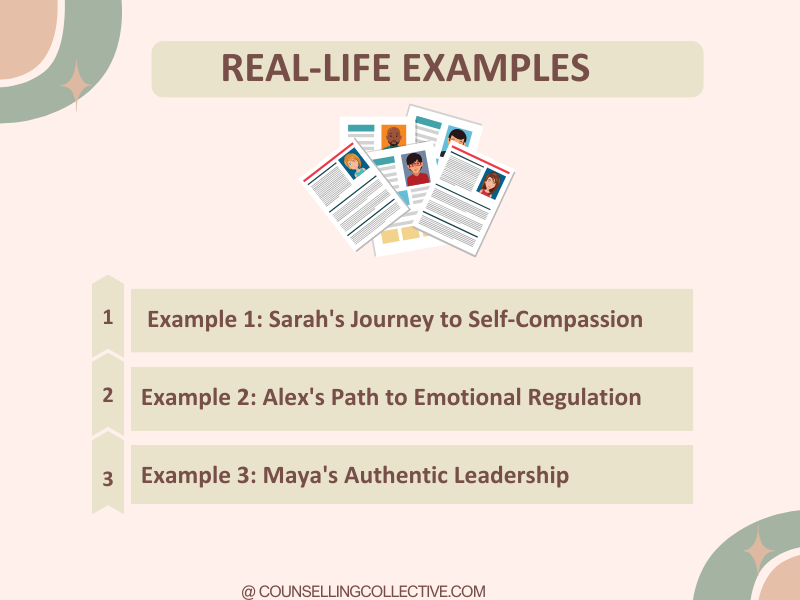
Example 1: Sarah’s Journey to Self-Compassion
Sarah, a successful professional, struggled with a relentless inner critic that eroded her self-esteem. Through mindfulness practices and self-compassion exercises, Sarah began to recognize her self-critical patterns and reframe her self-talk.
By treating herself with kindness and understanding, Sarah developed a newfound sense of self-acceptance and resilience. Her enhanced self-awareness empowered her to confront challenges with a compassionate perspective, transforming her relationship with herself and others.
Example 2: Alex’s Path to Emotional Regulation
Alex, a college student, grappled with overwhelming anxiety and emotional volatility. Engaging in cognitive-behavioral therapy (CBT) and emotion regulation techniques, Alex honed his ability to identify and manage his emotions.
By observing his emotional triggers and practicing mindfulness, Alex learned to respond to his feelings rather than react impulsively. This heightened self-awareness allowed him to make informed decisions, cultivate healthier relationships, and navigate life’s stressors more effectively.
Example 3: Maya’s Authentic Leadership
Maya, a corporate leader, realized that her leadership style was not aligned with her core values. Through self-reflection and feedback from colleagues, Maya recognized the need for authentic leadership.
She commenced on a journey of introspection, exploring her values, strengths, and leadership philosophy. This self-awareness journey led Maya to reshape her leadership approach, fostering a more inclusive, empathetic, and empowering work environment that inspired her team and contributed to her professional fulfillment.
These cases showcase the transformative power of self-awareness in Sarah, Alex, and Maya’s lives. By integrating self-awareness techniques, they overcame challenges, unlocking the inner potential for lasting change. In the final section, we provide practical strategies for readers to infuse self-awareness into daily life, facilitating their journeys of growth.
Conclusion
Self-awareness is a transformative journey into the depths of our thoughts, emotions, and behaviors. This dynamic exploration enhances emotional intelligence, improves decision-making, and fosters better relationships. Armed with self-awareness, we gain clarity on our strengths, weaknesses, values, and aspirations, empowering us to align our choices with our authentic selves.
This self-knowledge acts as a shield against self-sabotage, breaking free from limiting patterns. Additionally, self-awareness forms the foundation for genuine connection and empathy with others. It’s a continuous journey, not a destination, providing a steady compass in navigating life’s complexities.
In a world of constant change, nurturing self-awareness transforms how we perceive ourselves and interact with the intricate tapestry of existence.
References
- Goleman, D. (1995). Emotional Intelligence. Bantam Books.Amazon.
- Damasio, A. (1999). The Feeling of What Happens: Body and Emotion in the Making of Consciousness. Harcourt Brace.Amazon.
- Tolle, E. (2004). A New Earth: Awakening to Your Life’s Purpose. Penguin.Amazon.
- Farb, N. A., Segal, Z. V., & Anderson, A. K. (2013). Mindfulness meditation training alters cortical representations of interoceptive attention. Social Cognitive and Affective Neuroscience, 8(1), 15-26
- Kabat-Zinn, J. (1994). Wherever You Go, There You Are: Mindfulness Meditation in Everyday Life. In R. Walsh & F. Vaughan (Eds.), Paths Beyond Ego (pp. 137-145). Penguin.Amazon.
- Heatherton, T. F., & Vohs, K. D. (2000). Interpersonal evaluations following threats to self: Role of self-esteem. In M. P. Zanna (Ed.), Advances in Experimental Social Psychology (Vol. 32, pp. 128-189).
